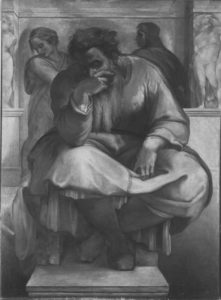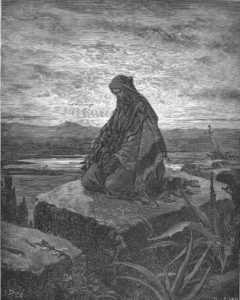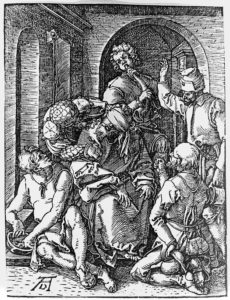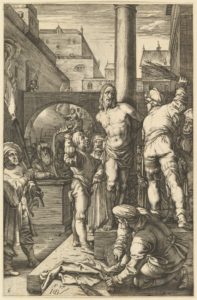The Chapters of Passiontide
by Fr. William Rock, FSSP
In these last two weeks of Lent, fittingly called Passiontide, the liturgical focus of the Church shifts from our sinfulness and the need to make reparations for our sins to contemplating Our Lord’s Passion and Death, which will soon be commemorated in the approaching solemn observances. One of the ways she does this is by the short readings daily presented in the Divine Office, called the Chapter. We will touch on each one in turn.

At Lauds, the early morning prayer, during Passiontide, the Church reads the following from the Prophet Jeremias in the 11th chapter of his book: “Come, let us put wood on his bread, and cut him off from the land of the living, and let his name be remembered no more”1 (Jer 11:19). The Epistle for the Tuesday of Holy Week is also from the same chapter of Jeremias and includes the quoted text. Immediately before what is quoted for Lauds is found, “And I was as a meek lamb, that is carried to be a victim: and I knew not that they had devised counsels against me” (Jer 11:19). The prophet is speaking in the person of Our Lord, the Lamb of God, Who was led to sacrifice as a meek lamb. Writing in the mid-1800s, Dom Guéranger wrote the following as a commentary for the Epistle for the Tuesday of Holy Week in his Liturgical Year:
Again we have the plaintive words of Jeremias: he gives us the very words used by his enemies, when they conspired his death. It is evident, however, that the prophet is here the figure of one greater than himself. Let us, say these enemies, put wood upon his bread: that is, let us put poisonous wood into what he eats, that so we may cause his death. This is the literal sense of these words, as applied to the prophet; but how much more truly were they fulfilled in our Redeemer! He tells us that His divine Flesh is the true Bread that came down from heaven. This Bread, this Body of the Man-God, is bruised, torn, and wounded; the Jews nail it to the wood; so that, it is, in a manner, made one with the wood, and the wood is all covered with Jesus’ Blood. This Lamb of God was immolated on the wood of the cross: it is by His immolation, that we have had given to us a Sacrifice which is worthy of God; and it is by this Sacrifice that we participate in the Bread of heaven, the Flesh of the Lamb, our true Pasch.2
St. Thomas, in his commentary on this passage, has the same interpretation: “Mystically, it is the body of Christ on the wood of the cross…”3

At the next Office, that of Prime, the following from the 50th chapter of the Prophet Isaias is read: “I have not turned away my face from them that rebuked me, and spit upon me. The Lord God is my helper, therefore am I not confounded” (Isa 50:6-7). Immediately before this excerpt in the text of Scripture, the following is found: “I have given my body to the strikers, and my cheeks to them that plucked them,” so that the full quote of the verses in consideration is: “I have given my body to the strikers, and my cheeks to them that plucked them: I have not turned away my face from them that rebuked me, and spit upon me. The Lord God is my helper, therefore am I not confounded: therefore have I set my face as a most hard rock, and I know that I shall not be confounded” (Isa 50:6-7). Just as with Jeremias at Lauds, Isaias is speaking in the person of Our Lord regarding His voluntary suffering and Passion. As with the Chapter from Lauds, this passage is part of a Gospel read during these two weeks, namely that for the Monday of Holy Week. Again, Dom Guéranger provides insight into this Epistle, and thus the Chapter:
The sufferings of our Redeemer, and the patience wherewith He is to bear them, are thus prophesied by Isaias, who is always so explicit on the Passion. Jesus has accepted the office of victim for the world’s salvation; He shrinks from no pain or humiliation: He turns not His Face from them that strike Him and spit upon Him. What reparation can we make to this infinite Majesty, who, that He might save us, submitted to such outrages as these? Observe these vile and cruel enemies of our divine Lord; now that they have Him in their power, they fear Him not. When they came to seize Him in the garden, He had but to speak, and they fell back upon the ground; but He has now permitted them to bind His hands and lead Him to the high priest. They accuse Him; they cry out against Him; and He answers but a few words. Jesus of Nazareth, the great teacher, the wonder-worker, has seemingly lost all His influence; they can do what they will with Him. It is thus with the sinner; when the thunder-storm is over, and the lightning has not struck him, he regains his courage. The holy angels look on with amazement at the treatment shown by the Jews to Jesus, and falling down, they adore the holy Face, which they see thus bruised and defiled: let us, also, prostrate and ask pardon, for our sins have outraged that same Face.4

At the midmorning Office, Terce, the Church again draws from the Prophet Jeremias, chapter 17: “O Lord: all that forsake thee shall be confounded: they that depart from thee, shall be written in the earth: because they have forsaken the Lord, the vein of living waters” (Jer 17:13). This text is also found in the Epistle for the Friday of Passion Week. Unlike the other texts examined up to this point, this excerpt is not a prophet speaking in the person of Our Lord about what He will undergo during His Passion; rather, here, the prophet foretells what will happen to those who have forsaken the One Who made this invitation: “If any man thirst, let him come to me and drink. He that believeth in me, as the scripture saith: Out of his belly shall flow rivers of living water” (Jon 7:37-38). It should be noted that Our Lord gave this invitation the day before He pardoned the woman caught in adultery, during which encounter He “wrote with his finger on the ground” (Joh 8:6; the Gospel for the Saturday following the Third Sunday of Lent). Cornelius a Lapide, in his commentary on this episode, explains Our Lord’s writing on the ground by referencing this passage from Jeremias (“they that depart from thee, shall be written in the earth”). Let this reading of Terce serve as a warning to Christians to never abandon or forsake “the Lord, the vein of living waters,” lest they find themselves under the associated censure.

The Hour of Sext, prayed at noon, again draws from the 17th chapter of the Prophet Jeremias: “Let them be confounded that persecute me, and let not me be confounded: let them be afraid, and let not me be afraid: bring upon them the day of affliction, and with a double destruction, destroy them, O Lord my God” (Jer 17:18). Just like the Chapter at Terce, this text is also part of the Epistle for the Friday of Passion Week and again concerns the doom of those who persecute Christ and reject the offer of salvation He holds out to them, while also expressing the hope of the Just Man trusting in God.
At the Hour of None, prayed in the midafternoon, a passage from the 18th chapter of the Prophet Jeremias is read: “Remember that I have stood in thy sight, to speak good for them, and turn away thy indignation from them” (Jer 18:20). This text is also contained in the Epistle for the Saturday of Passion Week. St. Thomas Aquinas, in his commentary on this passage has the following:
Concerning the phrase: that I may speak good for them (Jer 18:20), it should be noted that Christ speaks good for us that he may obtain mercy: Father, forgive them, for they know not what they do (Luke 23:34). To excuse guilt: we have an advocate with the Father, Jesus Christ, the just man; and he is the atonement for our sins (1 John 2:1–2). You have come to the mediator of the new covenant, and to the sprinkling of blood, which speaks better than that of Abel (Heb 12:24). To obtain glory: I desire that where I am, they also may be with me, that they may see my glory, which you have given me (John 17:24).
Unlike the previous two readings, which detail the portion of those who forsake or persecute Christ, this passage expresses the good lot of those who turn to Christ, Who, in the light of His Passion, intercedes for them before the Father.
At Vespers, the evening Office, the reading continues from where the one at Lauds ended in the 11th chapter of Jeremias (Jer 11:20): “But thou, O Lord of Sabaoth, who judgest justly, and triest the reins and hearts, let me see thy revenge on them: for to thee I have revealed my cause, O Lord my God.” Just like the reading at Lauds, this reading is also found in the Epistle for the Tuesday of Holy Week. As with the readings at Terce and Sext, this Chapter treats with the fate of those who have persecuted Our Lord and also His Mystical Body. St. Thomas explains this passage as follows:
Let me see your vengeance upon them, from the person of Christ, on those who are stubborn, for he prays for others. Father, forgive them, for they know not what they do (Luke 23:34). You have seen, O Lord, their iniquity against me, judge my cause (Lam 3:59). And he gives the reason: for to you have I revealed, not as to one who did not know, but trusting my whole cause to you. Cast your care upon the Lord, and he will sustain you (Ps 54:22 [23]).
These are the reflections which Holy Mother Church would like us to consider in these days – as they are presented in the daily Office – as we approach the Triduum. May we profit from them.
William Rock, FSSP was ordained in the fall of 2019 and is currently assigned to Regina Caeli Parish in Houston, TX.
- These Chapters, along with their Offices, can be found on The Divinum Officium Project.
- Prosper, Guéranger. The Liturgical Year – Volume VI – Passiontide and Holy Week. Fitzwilliam: Loreto Publications, 2000, pp. 258-259.
- The translations of the St. Thomas’ Commentaries were taken from here.
- Guéranger, pp. 246-247.
April 4, 2022








